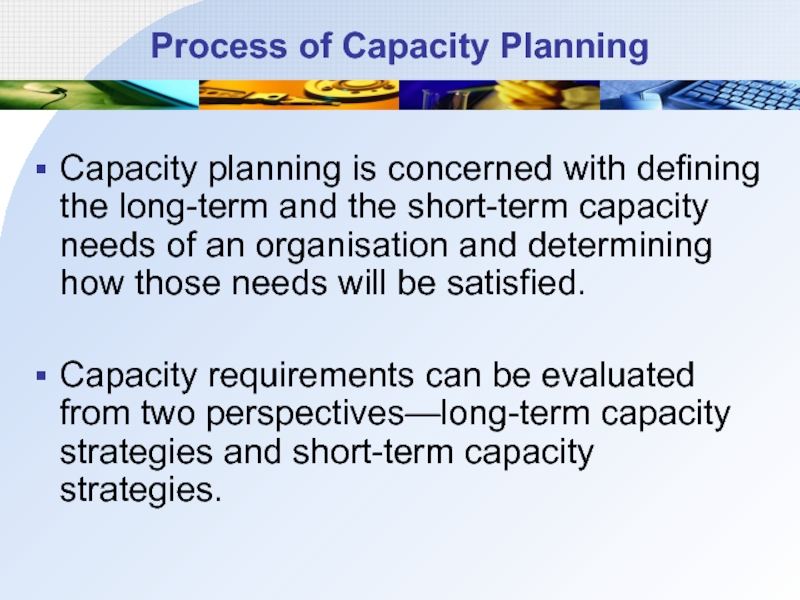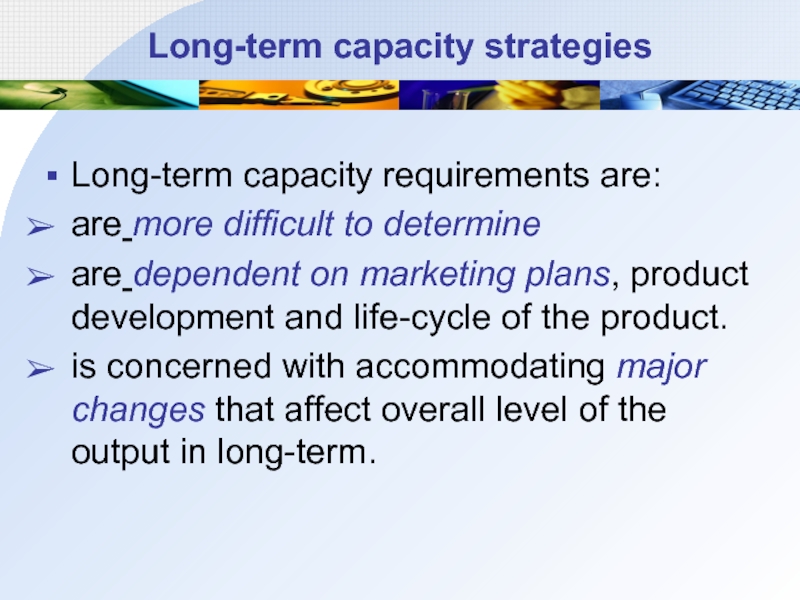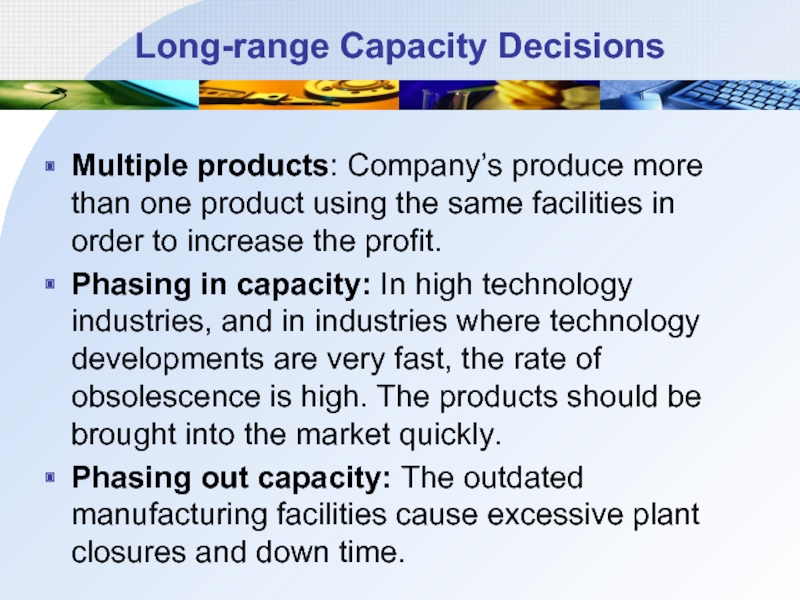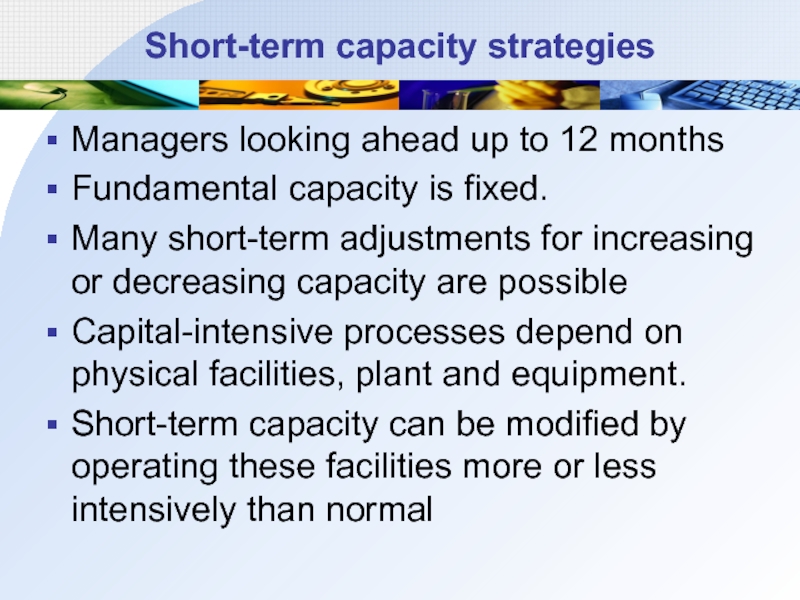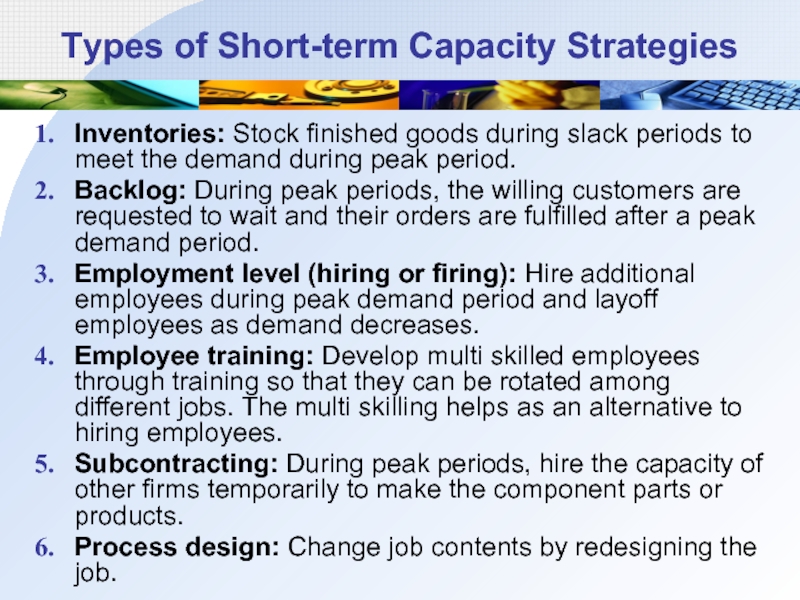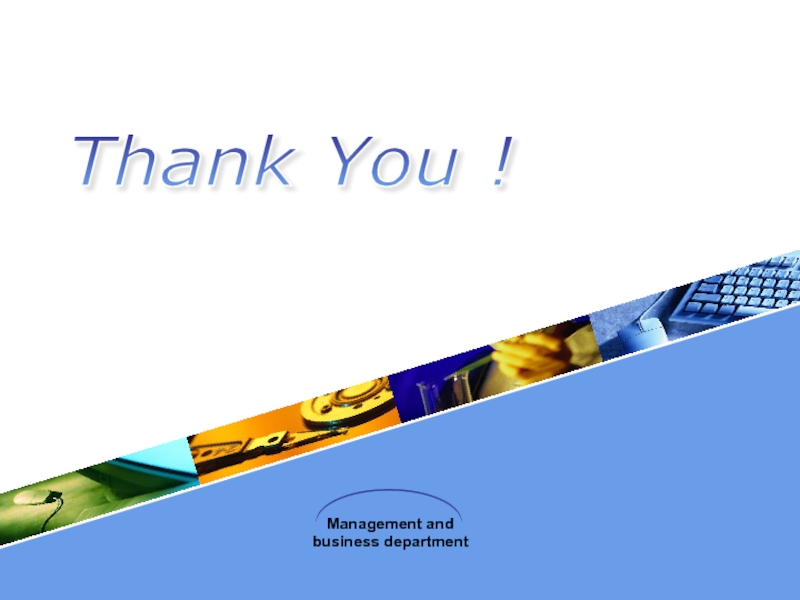- Главная
- Разное
- Дизайн
- Бизнес и предпринимательство
- Аналитика
- Образование
- Развлечения
- Красота и здоровье
- Финансы
- Государство
- Путешествия
- Спорт
- Недвижимость
- Армия
- Графика
- Культурология
- Еда и кулинария
- Лингвистика
- Английский язык
- Астрономия
- Алгебра
- Биология
- География
- Детские презентации
- Информатика
- История
- Литература
- Маркетинг
- Математика
- Медицина
- Менеджмент
- Музыка
- МХК
- Немецкий язык
- ОБЖ
- Обществознание
- Окружающий мир
- Педагогика
- Русский язык
- Технология
- Физика
- Философия
- Химия
- Шаблоны, картинки для презентаций
- Экология
- Экономика
- Юриспруденция
Capacity Planning презентация
Содержание
- 1. Capacity Planning
- 2. Structure of topic 1 2 Capacity
- 3. Manufacturing System Manufacturing systems produce standardized products
- 4. Service Systems Service systems present more uncertainty
- 5. Capacity definition Capacity is the maximum output
- 6. Measures of capacity Capacity can be difficult
- 7. Measures of capacity
- 8. Importance of Capacity Decisions Impacts ability to
- 9. Relationship between Capacity and Output
- 10. Various Capacities Designed capacity of a facility
- 11. Efficiency and Utilization Both measures expressed as percentages
- 12. Determinants of Effective Capacity Facilities Product and
- 13. Capacity Management Goal The objective of capacity
- 14. Capacity Planning Capacity planning is the process
- 15. Three Steps for Capacity Planning Determine Service
- 16. How Much Capacity Is Best? The Best
- 17. Best Operating Level
- 18. Evaluating Alternatives
- 19. Evaluating Alternatives
- 20. Cost-Volume Relationships
- 21. Break-Even Problem
- 22. Assumptions of Cost-Volume Analysis One product is
- 23. Evaluating Capacity Alternatives Cost-Volume Formulas TC=FC+(VCxQ) TR=RxQ P=TR–TC P=(RXQ)–[FC+(VCXQ)] Volume=(SP+FC)/(R-VC) QBEP=FC/(R-VC)
- 24. Process of Capacity Planning Capacity planning
- 25. Long-term capacity strategies Long-term capacity requirements
- 26. Long-range Capacity Decisions Multiple products: Company’s
- 27. Short-term capacity strategies Managers looking ahead
- 28. Types of Short-term Capacity Strategies Inventories: Stock
- 29. Thank You !
Слайд 2Structure of topic
1
2
Capacity planning
3
Process Of Capacity Planning
4
The Essence of
Capacity
Manufacturing and Service Systems
Слайд 3Manufacturing System
Manufacturing systems produce standardized products in large volumes.
finite capacity
contribute fixed costs
variable costs are added as labour
productivity is measurable quantity.
Слайд 4Service Systems
Service systems present more uncertainty with respect to both capacity
and costs.
services are produced and consumed in the presence of the customer
services must be sufficiently flexible to accommodate a highly variable demand
many services involves professional or intellectual services judgments that are not easily standardized.
difficult to accumulate costs and measure the productivity of the services.
services are produced and consumed in the presence of the customer
services must be sufficiently flexible to accommodate a highly variable demand
many services involves professional or intellectual services judgments that are not easily standardized.
difficult to accumulate costs and measure the productivity of the services.
Слайд 5Capacity definition
Capacity is the maximum output rate of a production or
service facility
Capacity = (number of machines or workers)*(number of shifts)*(utilization)*(efficiency)
The basic questions in capacity handling are:
What kind of capacity is needed?
How much is needed?
When is it needed?
Capacity = (number of machines or workers)*(number of shifts)*(utilization)*(efficiency)
The basic questions in capacity handling are:
What kind of capacity is needed?
How much is needed?
When is it needed?
Слайд 6Measures of capacity
Capacity can be difficult to quantify due to …
–
Day-to-day uncertainties such as employee absences, equipment breakdowns, and material-delivery delays
– Products and services differ in production rates (so product mix is a factor)
– Different interpretations of maximum capacity
– Products and services differ in production rates (so product mix is a factor)
– Different interpretations of maximum capacity
Слайд 8Importance of Capacity Decisions
Impacts ability to meet future demands
Affects operating costs
Major
determinant of initial costs
Involves long-term commitment
Affects competitiveness
Affects ease of management
Globalization adds complexity
Impacts long range planning
Involves long-term commitment
Affects competitiveness
Affects ease of management
Globalization adds complexity
Impacts long range planning
Слайд 10Various Capacities
Designed capacity of a facility is the planned or engineered
rate of output of goods or services under normal or full scale operating conditions. = maximum obtainable output
System/effective capacity is the maximum output of the specific product or product mix the system of workers and machines is capable of producing as an integrated whole. = expected variations
Actual output – rate of output actually achieved – cannot exceed effective capacity = unexpected variations and demand
System/effective capacity is the maximum output of the specific product or product mix the system of workers and machines is capable of producing as an integrated whole. = expected variations
Actual output – rate of output actually achieved – cannot exceed effective capacity = unexpected variations and demand
Слайд 12Determinants of Effective Capacity
Facilities
Product and service factors
Process factors
Human factors
Operational factors
Supply chain
factors
External factors
External factors
Слайд 13Capacity Management Goal
The objective of capacity management (i.e. planning and control
of capacity) is to match the level of operations to the level of demand.
Слайд 14Capacity Planning
Capacity planning is the process used to determine how much
capacity is needed (and when) in order to manufacture greater product or begin production of a new product.
Слайд 15Three Steps for Capacity Planning
Determine Service Level Requirements
Analyze Current Capacity
Planning for
the future
Слайд 16How Much Capacity Is Best?
The Best Operating Level is the output
than results in the lowest average unit cost
Economies of Scale:
– Where the cost per unit of output drops as volume of output increases
– Spread the fixed costs of buildings & equipment over multiple units, allow bulk purchasing & handling of material
Diseconomies of Scale:
– Where the cost per unit rises as volume increases
– Often caused by congestion (overwhelming the process with too much work-in-process) and scheduling complexity
Economies of Scale:
– Where the cost per unit of output drops as volume of output increases
– Spread the fixed costs of buildings & equipment over multiple units, allow bulk purchasing & handling of material
Diseconomies of Scale:
– Where the cost per unit rises as volume increases
– Often caused by congestion (overwhelming the process with too much work-in-process) and scheduling complexity
Слайд 22Assumptions of Cost-Volume Analysis
One product is involved
Everything produced can be sold
Variable
cost per unit is the same regardless of volume
Fixed costs do not change with volume
Revenue per unit constant with volume
Revenue per unit exceeds variable cost per unit
Fixed costs do not change with volume
Revenue per unit constant with volume
Revenue per unit exceeds variable cost per unit
Слайд 23Evaluating Capacity Alternatives
Cost-Volume Formulas
TC=FC+(VCxQ)
TR=RxQ
P=TR–TC
P=(RXQ)–[FC+(VCXQ)]
Volume=(SP+FC)/(R-VC)
QBEP=FC/(R-VC)
Слайд 24Process of Capacity Planning
Capacity planning is concerned with defining the
long-term and the short-term capacity needs of an organisation and determining how those needs will be satisfied.
Capacity requirements can be evaluated from two perspectives—long-term capacity strategies and short-term capacity strategies.
Capacity requirements can be evaluated from two perspectives—long-term capacity strategies and short-term capacity strategies.
Слайд 25Long-term capacity strategies
Long-term capacity requirements are:
are more difficult to determine
are dependent on marketing plans, product development and life-cycle of the product.
is concerned with accommodating major changes that affect overall level of the output in long-term.
Слайд 26Long-range Capacity Decisions
Multiple products: Company’s produce more than one product
using the same facilities in order to increase the profit.
Phasing in capacity: In high technology industries, and in industries where technology developments are very fast, the rate of obsolescence is high. The products should be brought into the market quickly.
Phasing out capacity: The outdated manufacturing facilities cause excessive plant closures and down time.
Phasing in capacity: In high technology industries, and in industries where technology developments are very fast, the rate of obsolescence is high. The products should be brought into the market quickly.
Phasing out capacity: The outdated manufacturing facilities cause excessive plant closures and down time.
Слайд 27Short-term capacity strategies
Managers looking ahead up to 12 months
Fundamental capacity
is fixed.
Many short-term adjustments for increasing or decreasing capacity are possible
Capital-intensive processes depend on physical facilities, plant and equipment.
Short-term capacity can be modified by operating these facilities more or less intensively than normal
Many short-term adjustments for increasing or decreasing capacity are possible
Capital-intensive processes depend on physical facilities, plant and equipment.
Short-term capacity can be modified by operating these facilities more or less intensively than normal
Слайд 28Types of Short-term Capacity Strategies
Inventories: Stock finished goods during slack periods
to meet the demand during peak period.
Backlog: During peak periods, the willing customers are requested to wait and their orders are fulfilled after a peak demand period.
Employment level (hiring or firing): Hire additional employees during peak demand period and layoff employees as demand decreases.
Employee training: Develop multi skilled employees through training so that they can be rotated among different jobs. The multi skilling helps as an alternative to hiring employees.
Subcontracting: During peak periods, hire the capacity of other firms temporarily to make the component parts or products.
Process design: Change job contents by redesigning the job.
Backlog: During peak periods, the willing customers are requested to wait and their orders are fulfilled after a peak demand period.
Employment level (hiring or firing): Hire additional employees during peak demand period and layoff employees as demand decreases.
Employee training: Develop multi skilled employees through training so that they can be rotated among different jobs. The multi skilling helps as an alternative to hiring employees.
Subcontracting: During peak periods, hire the capacity of other firms temporarily to make the component parts or products.
Process design: Change job contents by redesigning the job.
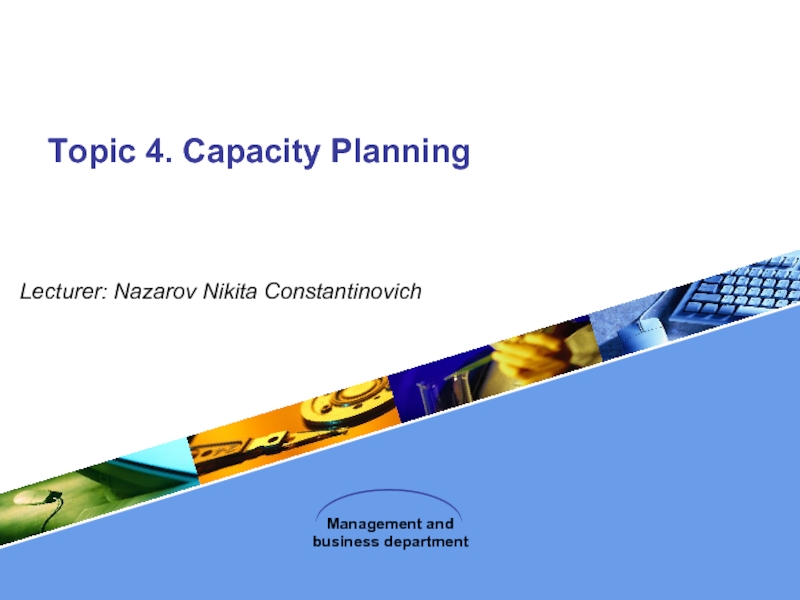
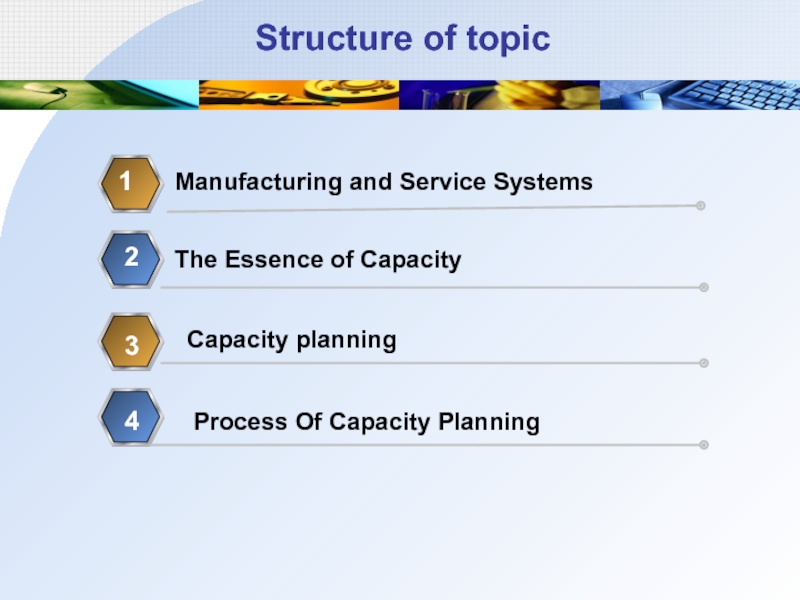
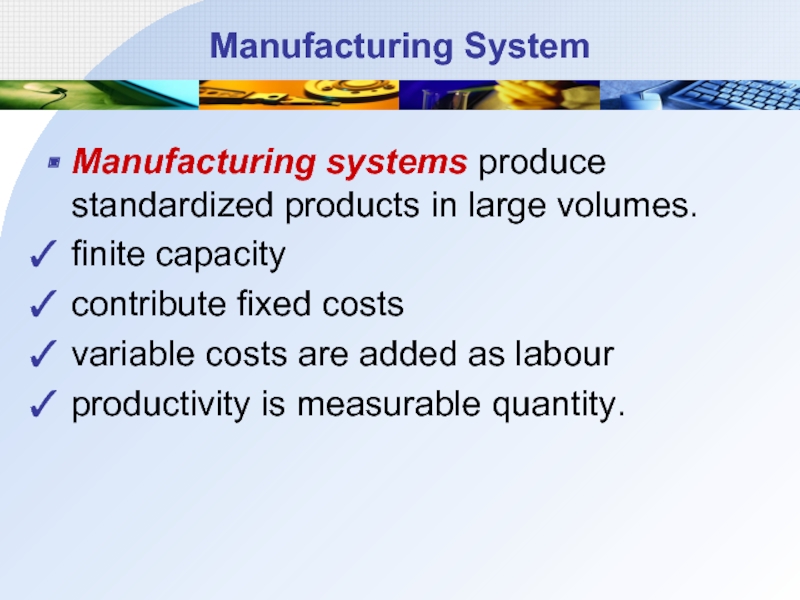
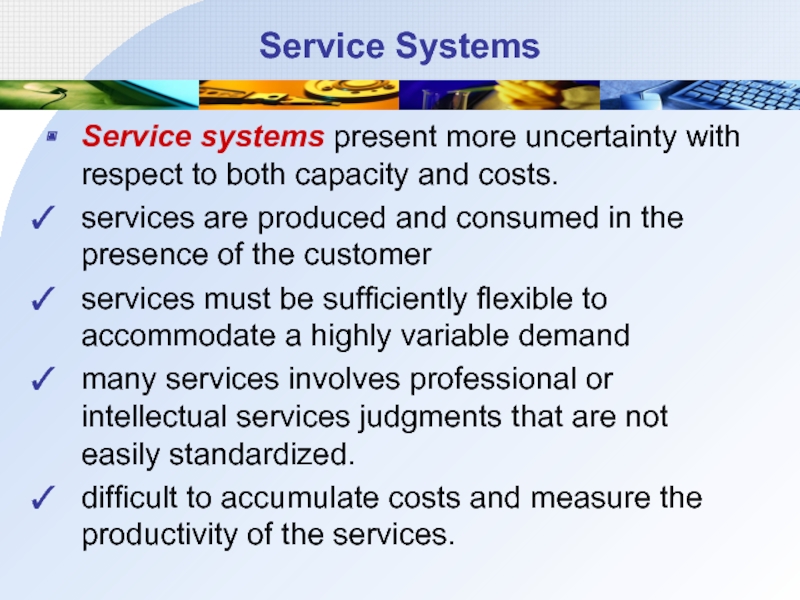
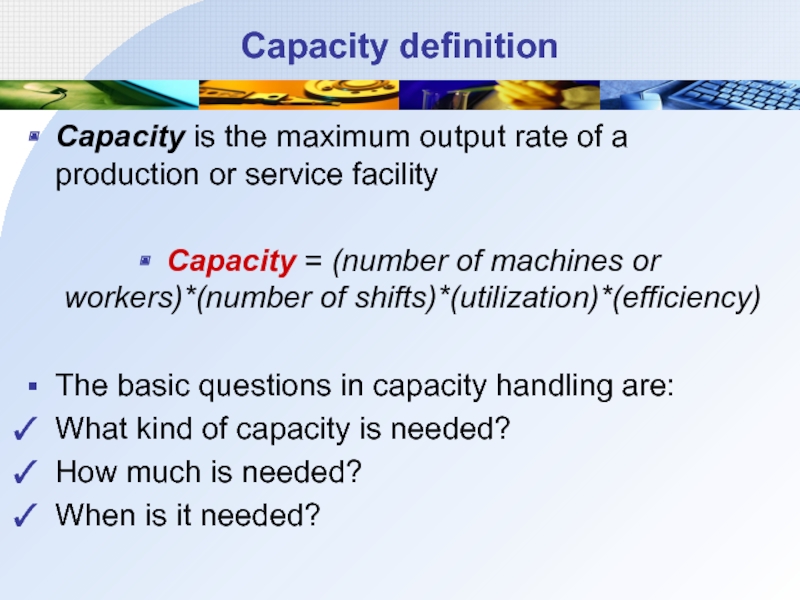
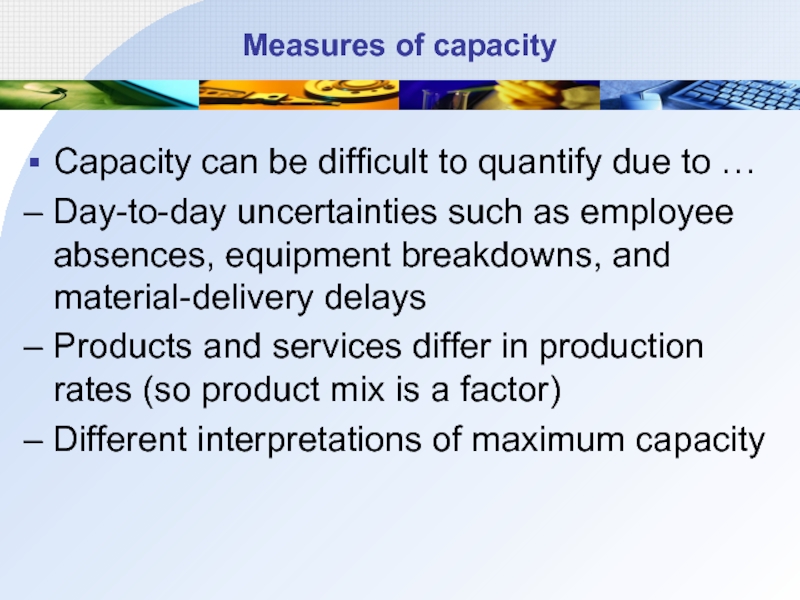
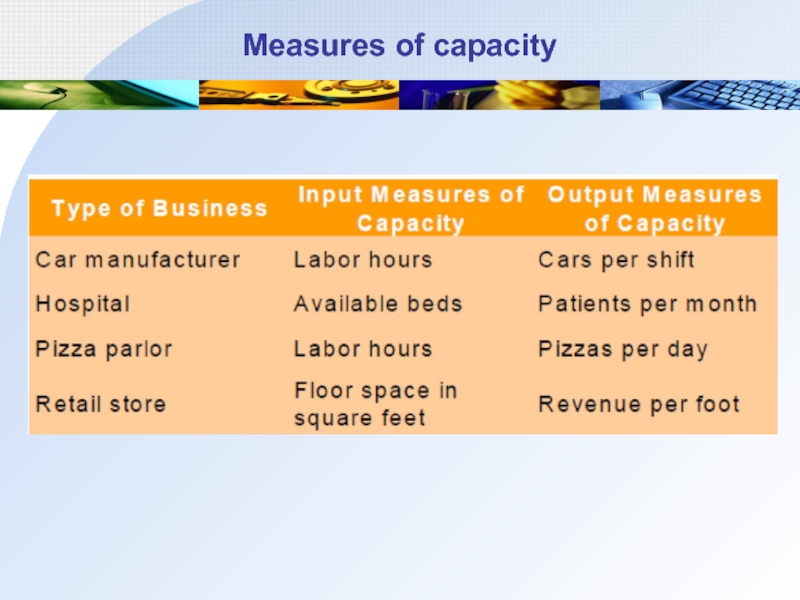
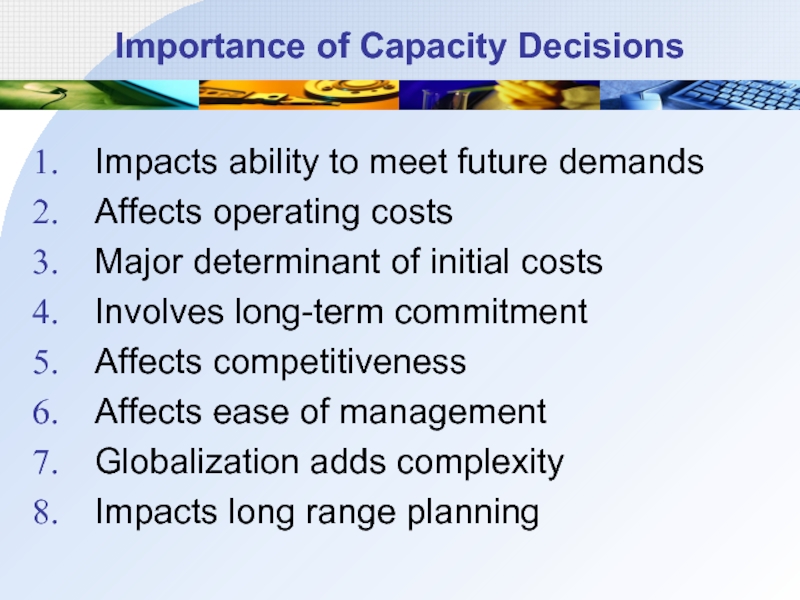
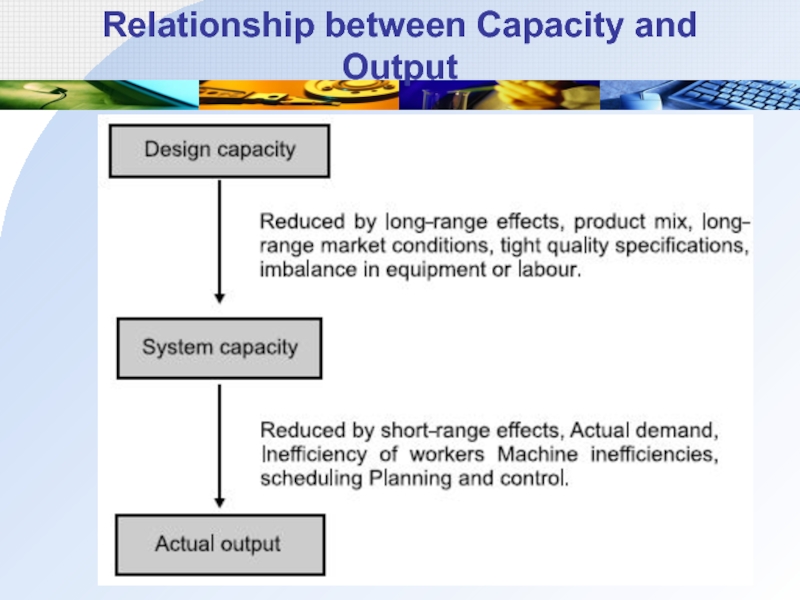
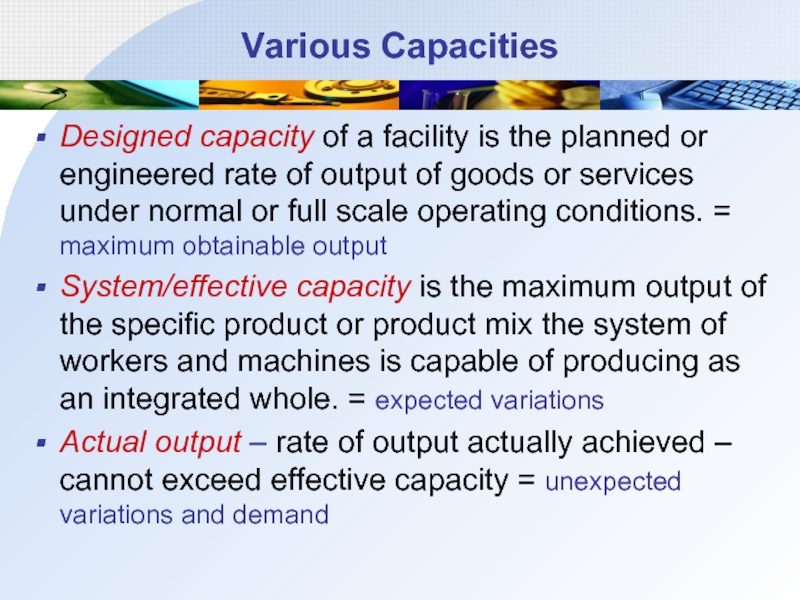
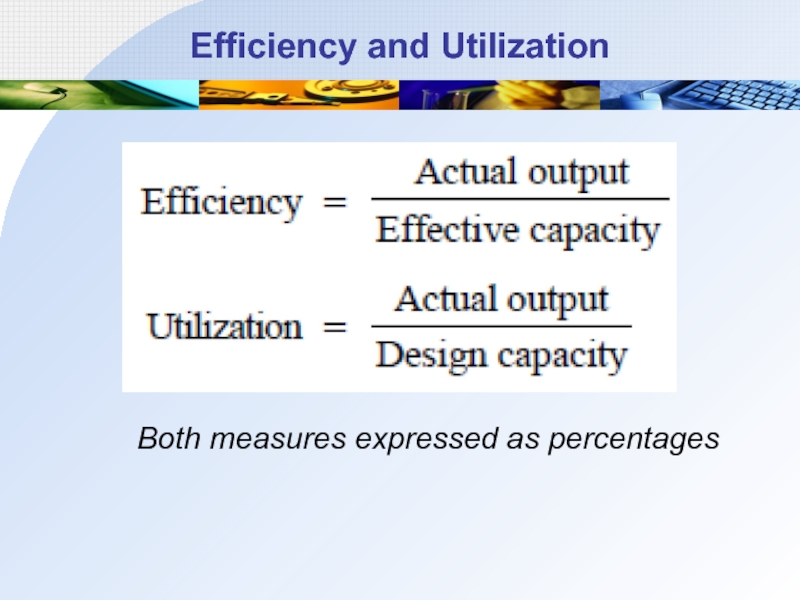
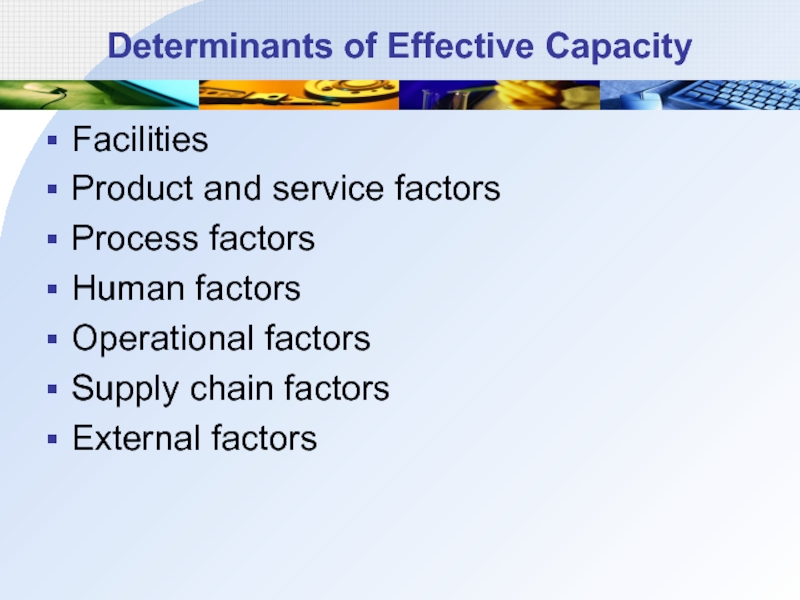
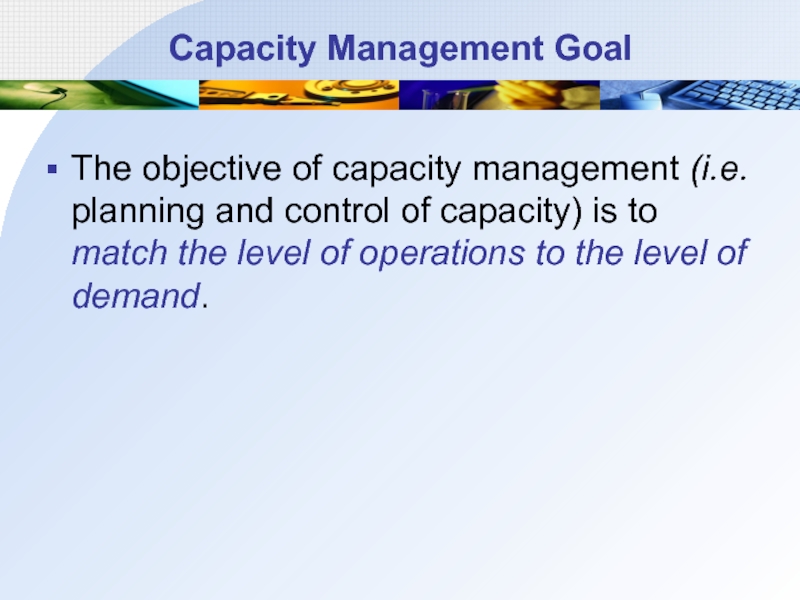
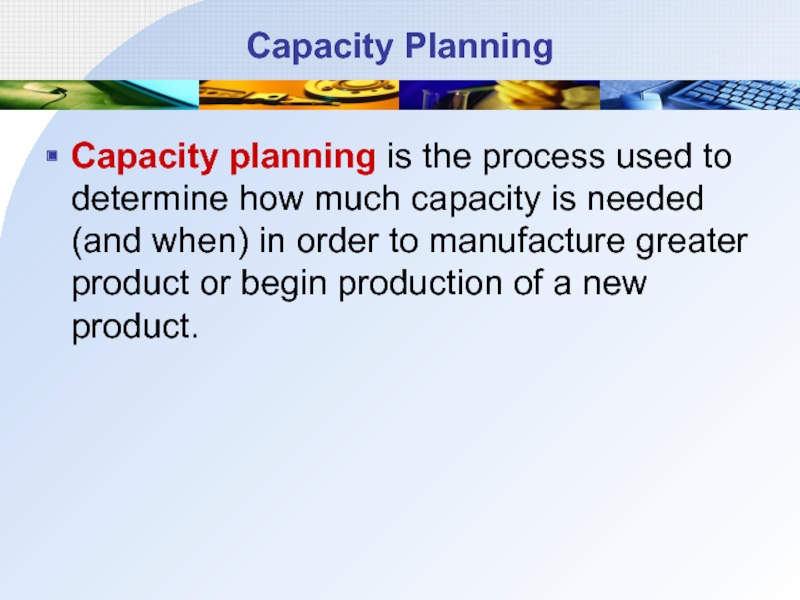
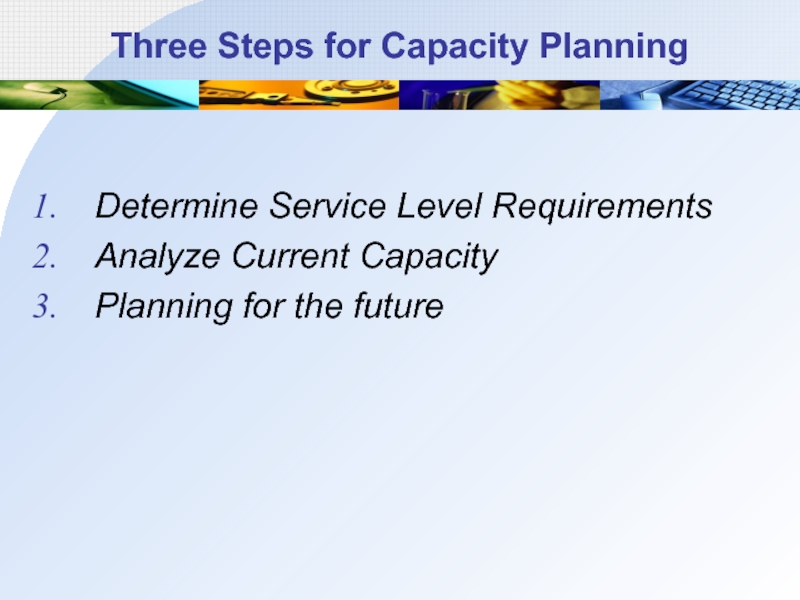
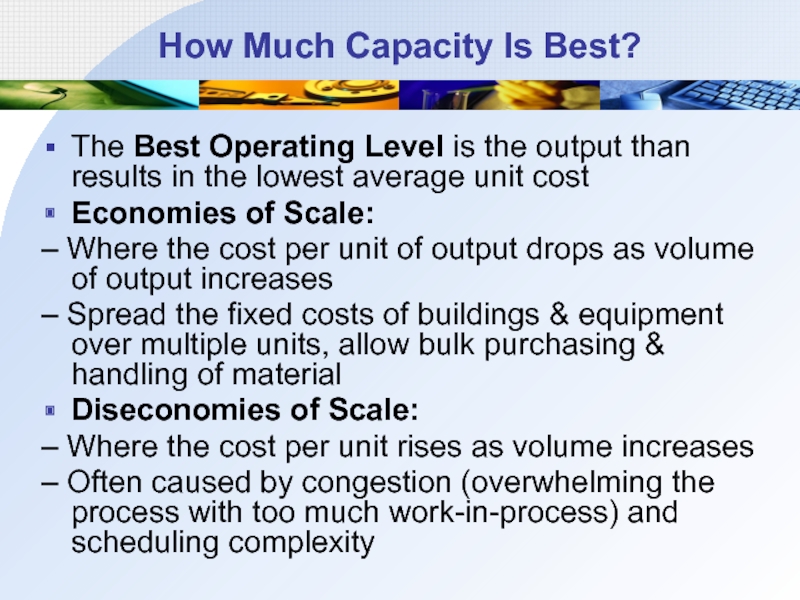
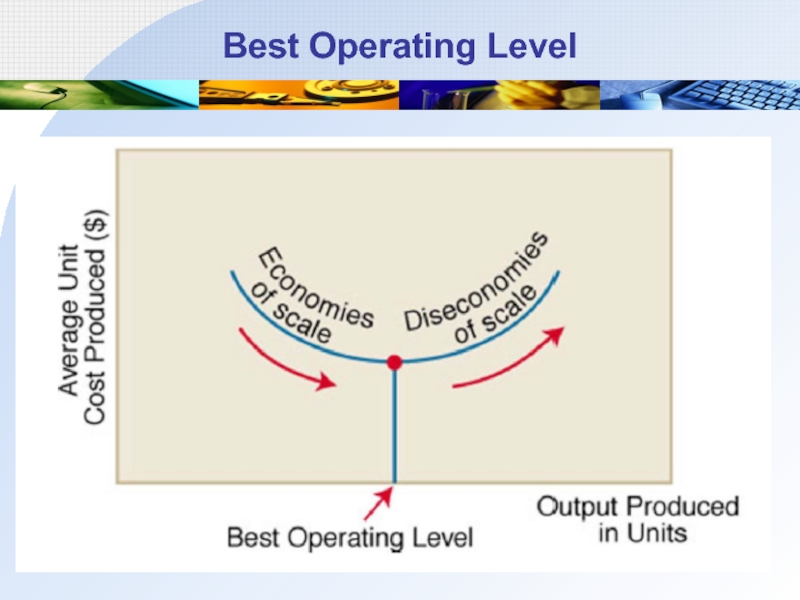
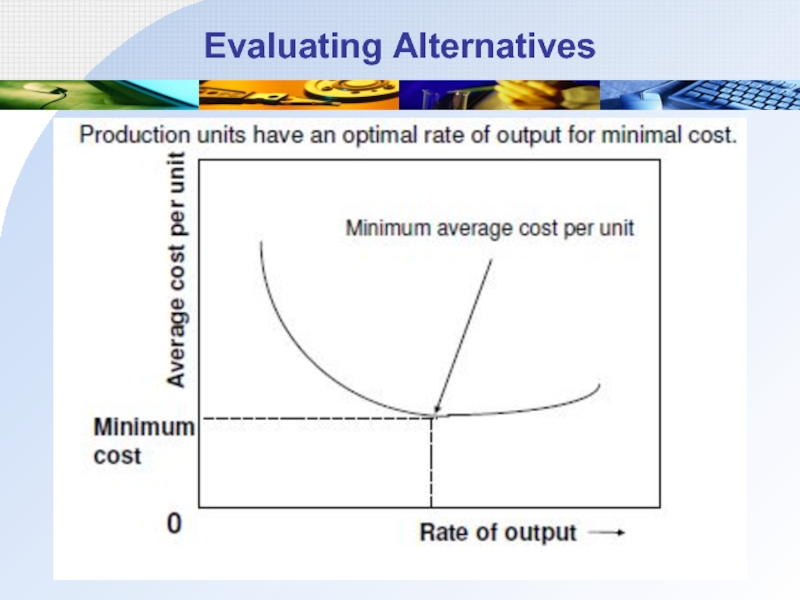
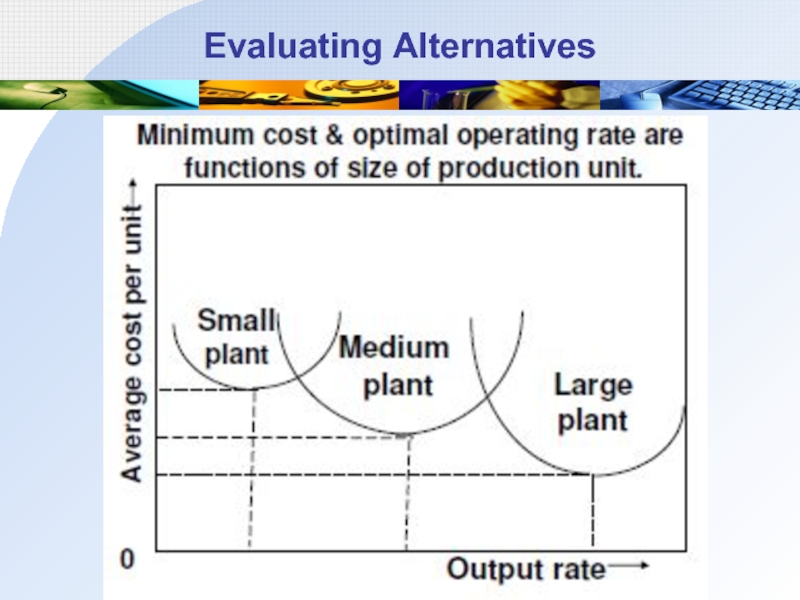
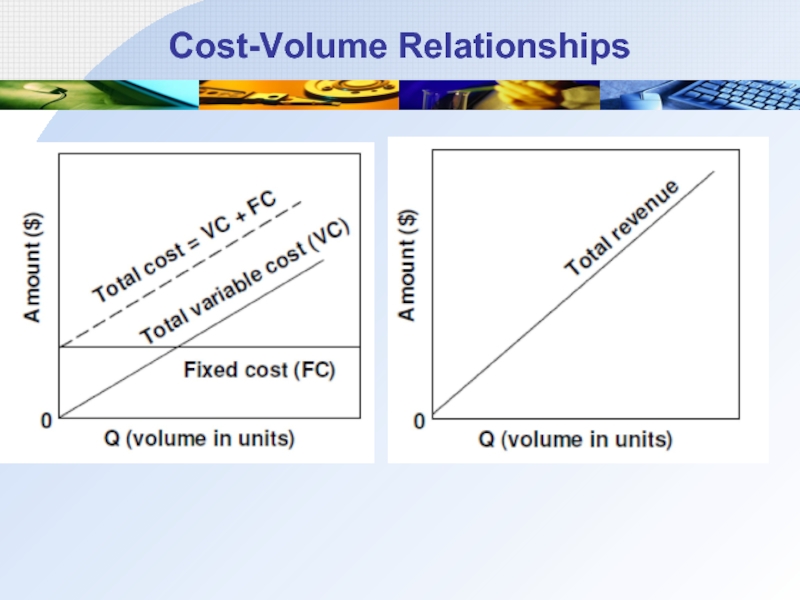
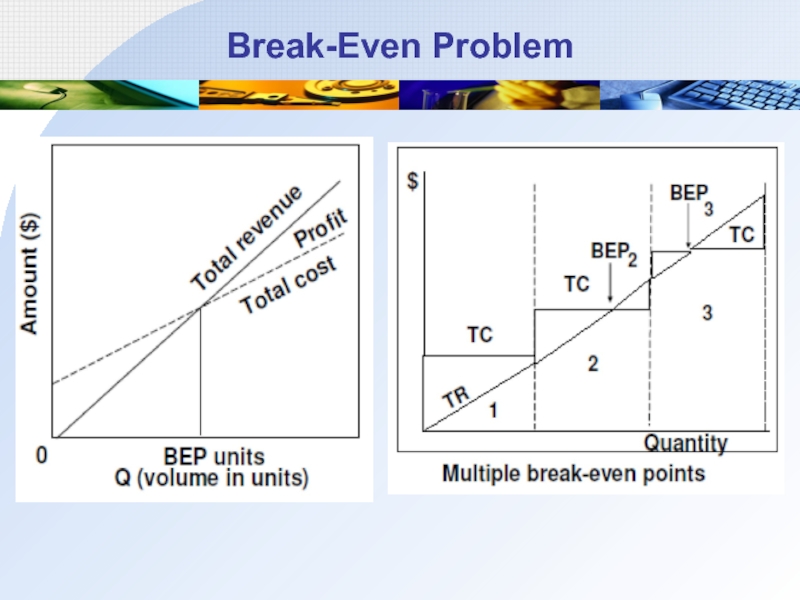
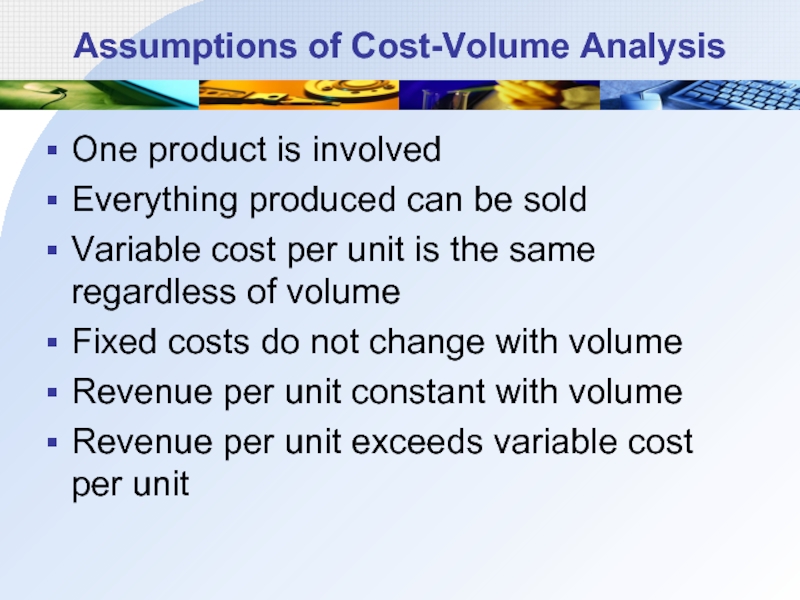
![Evaluating Capacity AlternativesCost-Volume FormulasTC=FC+(VCxQ)TR=RxQP=TR–TCP=(RXQ)–[FC+(VCXQ)]Volume=(SP+FC)/(R-VC)QBEP=FC/(R-VC)](/img/tmb/3/209749/afdfcc15ef2c8f20aea481e56c7fb50a-800x.jpg)
